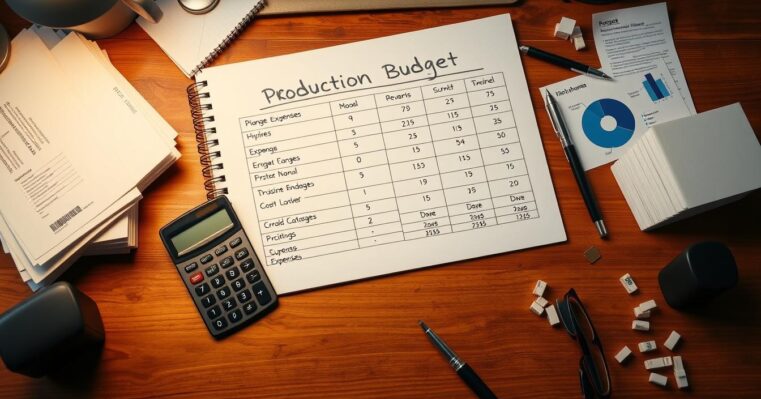As an event planner, you know how vital a detailed budget is for your event's success. Good financial management helps control costs, use resources wisely, and avoid risks in event planning1. Creating a budget sheet is key to planning financially. It outlines all expected costs and income sources1.
Event Production Budgeting is key to reaching your event goals. It involves understanding financial management's different parts.
Tracking expenses against revenue at each planning stage helps make smart financial choices1. It's also important to find various ways to make money to plan financially well1. Knowing the difference between fixed and variable costs helps manage resources better1. This is a big part of Event Production Budgeting and financial management.
Key Takeaways
- Event Production Budgeting is essential for maintaining financial control and allocating resources effectively.
- Developing an event budget sheet helps create a financial blueprint for the event.
- Calculating cash flows is crucial for making informed financial decisions.
- Exploring multiple revenue streams ensures financial planning success.
- Understanding fixed and variable costs helps establish a structured framework for resource management.
- Event financial management is critical for achieving event goals and objectives.
- Effective budgeting can lead to a positive return on investment and achievement of event goals.
Understanding the Importance of Budgeting in Event Production
In event production, budget planning for events is key to success. It means estimating costs, setting aside funds for different parts of the event, and keeping track of spending2. This approach boosts efficiency and accountability among the event team. A well-thought-out budget lets you make smart choices and cover all event costs.
Identifying major expense areas is a big part of event cost estimation. These include venue costs, food, audio/visual gear, marketing, staff, entertainment, and more2. It's also wise to save 5-10% of the budget for unexpected costs2. Plus, having various income streams, like ticket sales and sponsorships, can help cover expenses2.
Keeping a close eye on actual spending versus the budget is vital in event production2. Using event software, training staff, and regularly checking finances are good ways to manage expenses2. By focusing on budget planning for events and event cost estimation, you can host a successful and financially sound event.
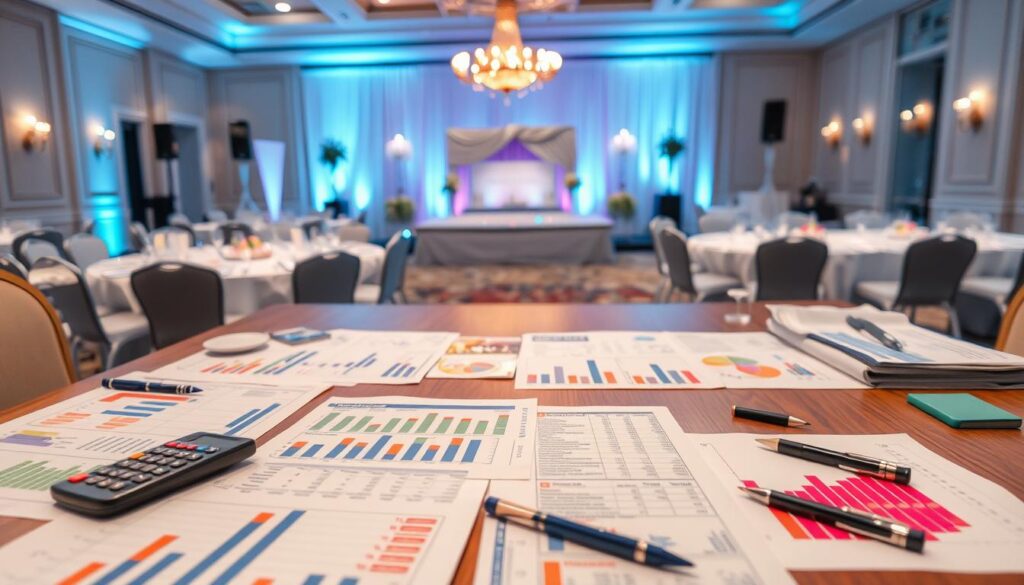
There are many resources to help with event production, like funding and business packages3. By using these resources and focusing on budget planning for events, you can host a memorable and successful event.
Key Components of an Event Production Budget
When planning an event, it's key to know what costs are involved. You need to budget for venue, staff, equipment, and food. This helps in making sure your event is both successful and affordable.
Most of your budget will go to the venue. This includes rent, utilities, and upkeep4. You'll also spend on staff, like event planners and security5. Don't forget about the tech needs, like sound and lights6.
Food and hospitality are also big parts of your budget4. It's important to find a balance between quality and cost. This way, you can have a great event without breaking the bank5.
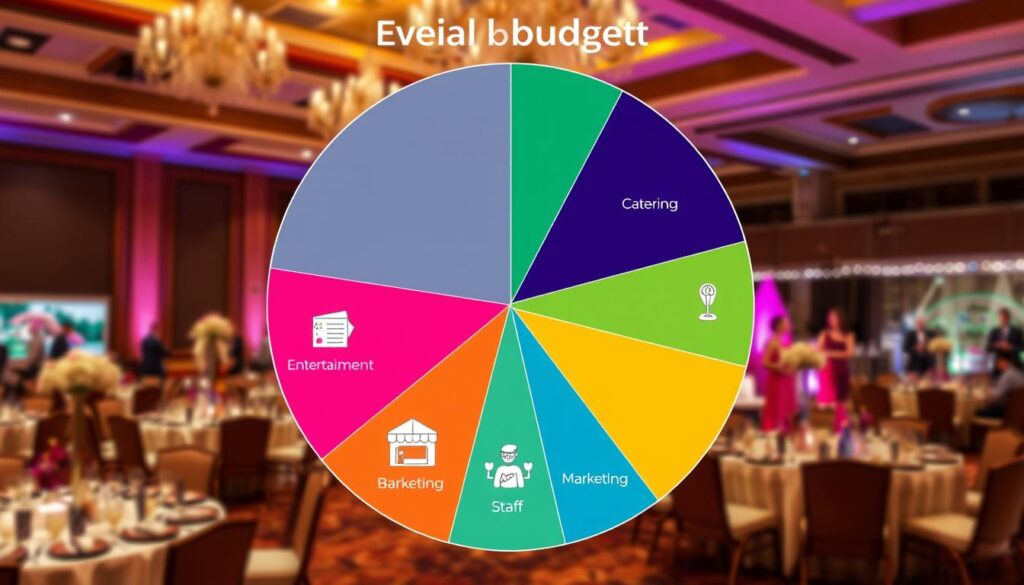
To make your event a hit, focus on where to spend your money. Knowing what your budget covers helps. This way, you can give your guests a memorable time and reach your event goals.
Defining Your Event Goals and Objectives
Starting with event budget planning means first defining your goals and objectives. This guides your financial decisions and ensures your budget matches your strategy. Setting SMART goals is key for successful planning7. Possible KPIs include cost per customer, number of leads, revenue, and more7.
A good event budget is based on clear, measurable goals. For example, you might aim to sell 20% more tickets8 or boost ROI by a certain percentage8. It's important to balance budget and goals for success9.
When setting goals, align them with your brand's strategies and mission7. Focus on outcomes you can measure. Use event software to track important data7.

Clear, measurable goals lead to a solid event budget plan. This plan aligns with your strategy and helps reach your goals. Always review and adjust your budget to stay on track.
Researching Costs and Gathering Estimates
When planning an event, it's key to estimate costs and make a budget. Start by looking at past events to understand costs and what matters most10. This helps you find ways to save money and use your budget wisely.
Getting quotes from vendors is another good step11. This gives you a clear idea of what things will cost. By comparing these quotes, you can find the best deals. Experts also suggest having a backup fund for unexpected costs and keeping track of expenses as they happen12.
Here are some important things to think about when looking at costs and getting estimates:
- Figure out what you really need, like a venue and food
- Break your budget into smaller parts using percentages or dollars
- Look into different ways to track your money, like cash flow statements

By taking these steps and using data from experts1011, and12, you can make a detailed budget. This will help ensure your event is a success.
| Expense Category | Estimated Cost |
|---|---|
| Venue Rental | $10,000 |
| Catering Costs | $8,000 |
| Audio-Visual Equipment | $5,000 |
Calculating Contingency Funds for Unexpected Expenses
When planning an event, it's key to think about unexpected costs. A contingency fund is vital for managing these risks. It's suggested to set aside 5% to 15% of the budget for this purpose13.
To figure out how much to save, look at the event's size, complexity, and location. This helps you guess how much might go wrong and plan for it. For instance, a big event with many vendors needs more savings than a small one14.
Keep checking and updating your contingency plan as you plan the event15. This way, you'll always have enough money for surprises. Ways to save include getting better deals, finding new solutions, using sponsorships, and making extra money14.
Here are some key things to remember when setting aside contingency funds:
- Save 5% to 15% of the total budget for unexpected costs13
- Think about the event's size, complexity, and location14
- Update your contingency plan often as you plan the event15
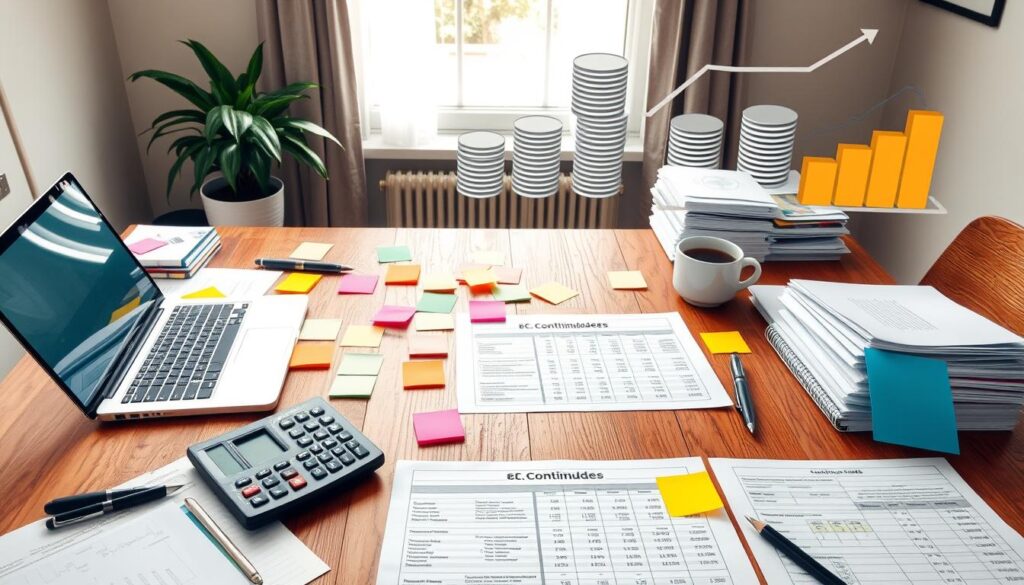
Having a contingency fund in your event budget helps you deal with surprises. It makes your event planning stronger and more effective13.
Setting Priorities: What to Spend On First
When planning an event, it's key to know where to spend your money. You should focus on what matters most, like food, venue, or entertainment16. For example, if your guests love food, spend more on that. Knowing what your guests want helps make sure they have a great time.
It's important to weigh the cost of each item to get the most value. You need to decide what's essential and what's nice to have. Things like venue, speakers, and food are must-haves. Decorations and giveaways are nice but can be cut if needed17. By focusing on the basics and negotiating with vendors, you can save money and adjust plans as needed.
Here are some tips to help you prioritize your event budget allocation:
- Identify your event goals and objectives
- Conduct a value analysis for each expense
- Prioritize core costs such as venue, essential staff, and basic infrastructure
- Negotiate with vendors and service providers to save costs
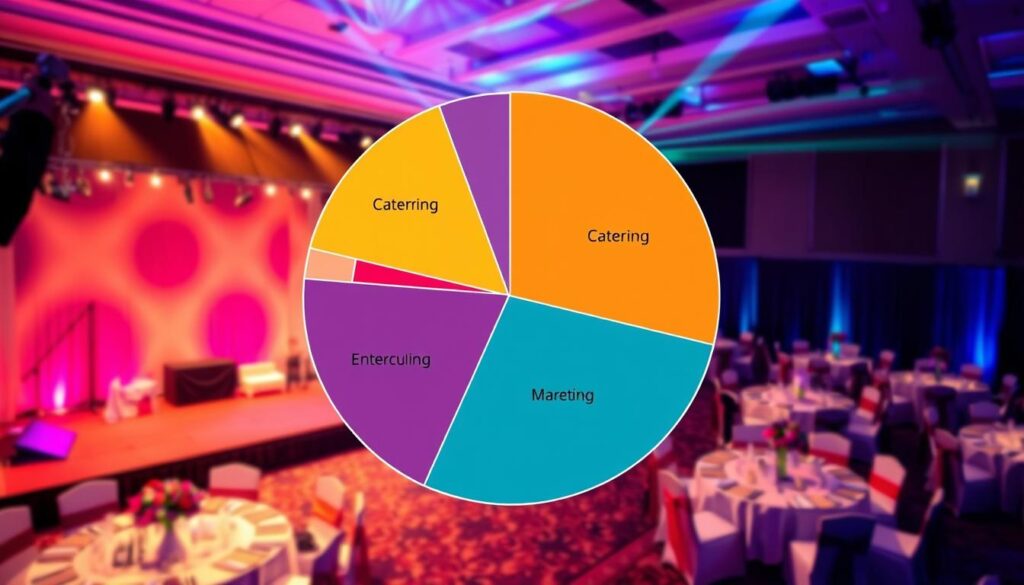
By following these tips and focusing on what's important, you can have a successful event. Make sure to check your budget often to stay on track17.
| Event Component | Priority Level |
|---|---|
| Venue | High |
| Food and Beverage | Medium |
| Entertainment | Low |
Tracking Your Budget Throughout the Planning Process
As you plan your event, keeping an eye on your spending is key. Event budget tracking helps you stay within your budget and use your resources wisely. Using budgeting software or spreadsheets lets you track your spending in real-time. This makes it easier to find ways to save money and use your funds better18.
It's important to regularly review your finances. These reviews help you see how your spending compares to your budget. Event planners often adjust their budgets 2-3 times to handle unexpected costs18. Being flexible and proactive helps avoid overspending and keeps your event on track.
Regular Review Sessions
In these review sessions, check your expenses and find ways to save. You might renegotiate with vendors or adjust your marketing plans. By actively managing your budget, you can ensure your event is financially successful19.
Adjusting for Changes
As your plans change, be ready to adjust your budget. You might need to spend more on some things or less on others. Being flexible and proactive helps keep your event on track and saves money. Good vendor negotiation can save up to 15-20% on costs, helping with event financial management18.
Effective Communication with Your Event Team
When you start event budget planning, remember how important talking to your team is. You need to make sure everyone knows about the budget and any changes20. This way, everyone works together towards the same goal, making your event a success.
Having a good communication plan is key. It keeps everyone, from planners to sponsors, informed and excited21. Use social media, emails, flyers, and word-of-mouth to spread the word. This helps you promote and manage your event well.
Here are some tips for better communication:
- Know who you're talking to and what you want to say
- Choose the right ways to talk to people and when to do it
- Make sure everyone knows their job
- Check how things are going and see if it's working
By using these tips, your team will be informed and work well together. This leads to a successful event22.
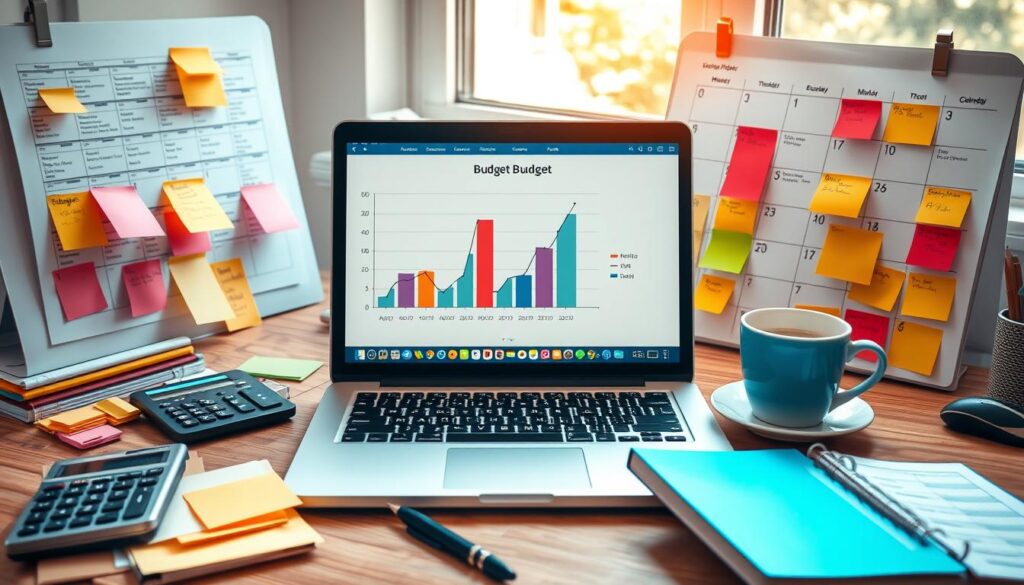
Don't forget, good communication keeps your team on track. It makes sure your event budget planning and event financial management meet your goals. With a solid communication plan, your event is set for success20.
Tips for Cost-Saving Without Compromising Quality
Every detail matters when you're trying to save money on events. Look into sponsorships or partnerships to help cover costs23. Sponsors can give you money, products, or services in return for promoting their brand at your event. This can really cut down on costs for things like renting space, food, and tech23.
Another smart move is to talk to vendors and try to get better deals. Building strong relationships with suppliers can lead to discounts or even better packages, which is great for repeat customers23. Also, choosing dates that aren't as busy can save you money on renting space and other services23.
Negotiating with Vendors
Talking to vendors is key to saving money on events. It helps you cut costs and use your resources better24. You should figure out the break-even point in your budget to know how much money you need to make to stay in the black24. This way, you can plan better and make sure your event is a hit.
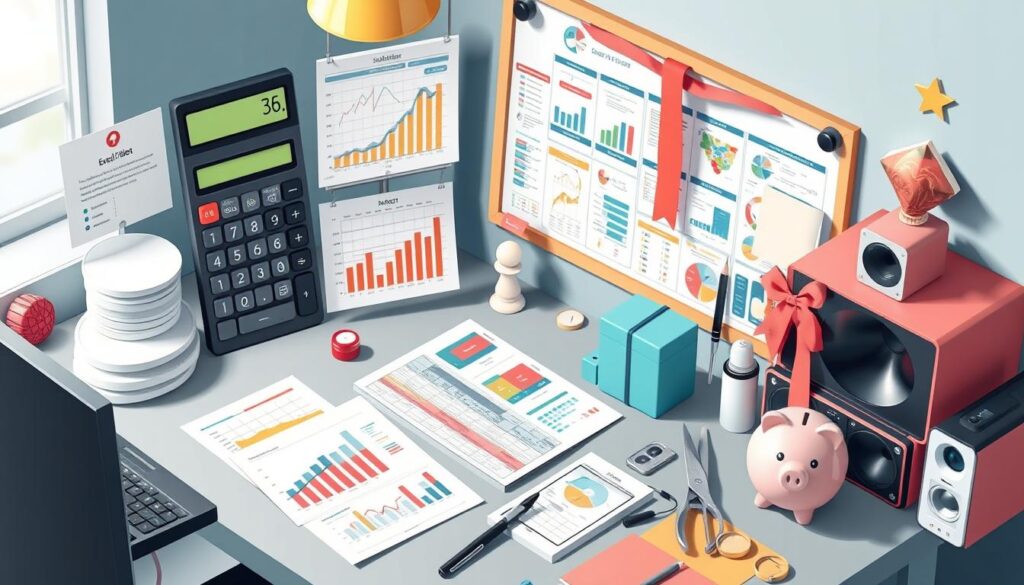
Leveraging Sponsorships
Using sponsorships is another smart way to save money and make your event better23. By working with sponsors, you can lower costs and make your event more fun23. It's important to have clear financial goals for your event. This helps you know which events are worth the investment and which might not make as much money24. This way, you can use your budget wisely and have a successful event.
Finalizing and Presenting Your Event Budget
As you near the end of your event budget, it's key to do a detailed event budget analysis25. You should look at income and expenses like venue fees, food costs, and entertainment26. A detailed balance sheet will show your event's financial health, helping you make smart choices and tweaks.
A good budget lists both fixed and variable costs, like staff, marketing, and setup26. It's important to keep track of spending in real-time and save all receipts25. This way, you can see how you're doing against your budget and adjust if needed.
Good event financial management means being flexible and creative25. You might need to move money around or find new ways to save25. Focus on must-haves like venue, entertainment, and food first26. A clear, detailed budget shows you're good with money and can make smart choices.
When showing your budget, use charts or tables to show income and expenses25. This makes it easy for others to see your event's financial side and make good choices.
| Income | Expenses |
|---|---|
| Ticket sales | Venue rental |
| Sponsorships | Catering |
| Donations | Entertainment |
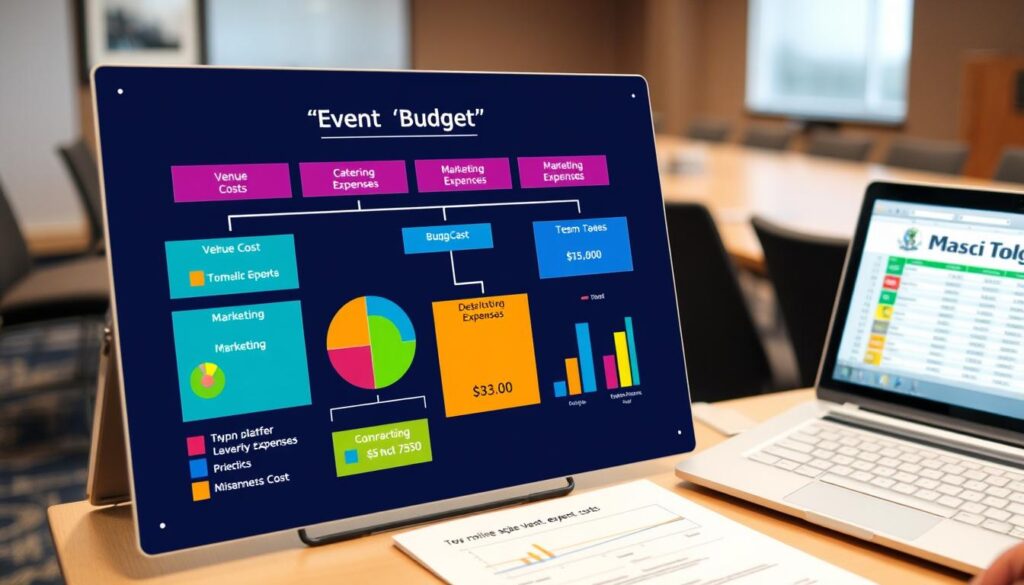
By taking these steps and looking at your event budget fully, you're on the right path25. You'll have a solid budget that helps your event succeed25.
Evaluating Post-Event Financial Performance
After your event, it's key to check your finances. Look at how your spending matched your budget. This helps you plan better for next time27.
Start by looking at how many people came. Knowing this helps you see if your event was a hit27. Then, go over your money records. This includes what you spent, what you made, and how you did financially27. Also, listen to what people thought. Their feedback can show you what worked and what didn't27.
Also, check how well your ads worked. See which ways reached the most people27. Look at the practical stuff too, like where you held it and how people got there27. Don't forget to ask others what they thought. This includes sponsors, partners, vendors, and guests27.
This deep dive into your event's finances will teach you a lot. You'll learn how to make your next event better and more cost-effective27. Remember, making your events better is an ongoing job. This step is key to making them more successful and affordable in the future.
Need help with your event budget? Contact our team at or call us at. Our pros are here from to help you reach your event goals.
FAQ
Why is budgeting critical in event production?
Budgeting is key to a successful event. It helps estimate costs and make smart decisions. It ensures every part of the event is covered financially. Good budgeting can turn an event into a success or a failure.
What are the key components of an event production budget?
A good event budget includes venue costs, staff and labor, equipment, and food and hospitality. It's important to split your money wisely among these areas for a solid budget.
How do I align my budget with my event's goals and objectives?
First, set clear goals for your event. This will help you decide how to spend your money. Each goal might need different amounts of money, so it's vital to match your budget to your goals.
What is the importance of including a contingency fund in my event budget?
A contingency fund, 15-20% of your budget, is essential for unexpected costs. It helps keep your event safe from financial surprises. It also lets you adjust to changes during planning.
How do I prioritize my budget allocation?
Focus on the most important parts of your event and spend there first. Different events need different priorities. Knowing what's most important helps you spend your money wisely.
Why is ongoing budget tracking important throughout the event planning process?
Tracking your budget closely lets you see where money is going and adjust as needed. Regular checks and being flexible with your budget are key to staying on track financially.
How can I optimize my budget without sacrificing event quality?
To save money without lowering quality, try negotiating with vendors and finding sponsors. Look for ways to cut costs in different areas. With smart planning, you can have a great event without breaking the bank.
Source Links
- https://iccbelfast.com/blogs/event-budgeting-guide
- https://www.eventsair.com/blog/event-budgeting
- https://fastercapital.com/topics/understanding-the-importance-of-event-budgeting.html
- https://www.eventmobi.com/blog/event-budget-basics/
- https://www.eventtia.com/en/blog/the-complete-guide-to-creating-a-budget-for-an-event
- https://stova.io/event-budget/
- https://www.socialtables.com/blog/event-planning/defining-event-goals/
- https://www.airmeet.com/hub/blog/virtual-event-goals-objectives-planning/
- https://eventgarde.com/blog/what-comes-first-in-event-planning-the-budget-or-the-goals
- https://bevy.com/b/blog/the-ultimate-three-phase-plan-for-event-budget-planning
- https://blog.eventsmart.com/2023/12/01/event-planning-budget/
- https://www.linkedin.com/advice/1/you-need-manage-your-event-production-budget-how-ey8re
- https://www.linkedin.com/advice/0/how-do-you-determine-appropriate-level-contingency-yys2c
- https://www.linkedin.com/advice/0/how-can-you-emphasize-importance-contingency-budgeting-b81ef
- https://circuitwest.com.au/resource/budgeting-for-events/
- https://www.linkedin.com/advice/0/youre-juggling-expenses-event-how-do-you-decide-9q1cc
- https://www.linkedin.com/advice/3/how-can-you-prioritize-expenses-when-planning-event-auvze
- https://www.theeventcompany.com/news/effective-strategies-for-managing-event-budgets-in-2024
- https://www.vfairs.com/blog/event-budget/
- https://www.linkedin.com/advice/3/what-do-you-your-event-budget-risk-due-ineffective-ofcdc
- https://www.dealroomevents.com/blog/event-communication-plan/
- https://www.linkedin.com/advice/0/what-most-effective-communication-strategies-managing-dppdf
- https://eventscase.com/blog/costs-of-organising-events
- https://6connex.medium.com/event-budgeting-made-easy-top-25-tips-for-event-management-budgets-9a37f27ea52f
- https://eventify.io/blog/event-budget
- https://www.travelperk.com/guides/event-budget/
- https://eventscase.com/blog/how-to-write-an-effective-post-event-report

